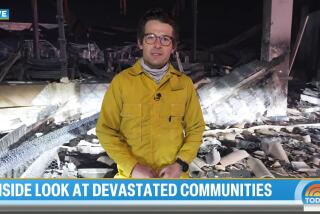Live, From Baghdad, World Learns of War From CNN Correspondents : Media: The American reporters are able to stay on air over telephone hookup that mysteriously remains open.
- Share via
WASHINGTON — The world heard the Persian Gulf war begin live over a mysteriously open telephone line Wednesday, and it listened for hours, as three Cable News Network correspondents, their phone sometimes perched out the window, narrated the bombing and wondered aloud why they were being allowed to continue broadcasting.
“As you’re talking, I’m going to pull your head out of the window,” CNN’s Bernard Shaw told colleague John Holliman at one point.
“You’re a good friend,” Holliman told him. “I’m not really happy to be here in this hotel, but we’re here.”
On ABC’s “World News Tonight,” the war erupted as a literal interruption. About 10 minutes into its early East Coast broadcast, anchor Peter Jennings, in New York, broke into a taped report to switch to correspondent Gary Shepard on the phone from Baghdad.
“There are flashes of light in the sky,” Shepard reported, “tracers of light, like anti-aircraft fire.”
A few minutes later, about 4 p.m. PST, NBC correspondent Tom Aspell was on the phone from Baghdad with anchor Tom Brokaw, also in New York. “The sky is full of tracers, full of tracers now, and there is a very big explosion on the western side of the city. You can hear it now, Tom.”
Aspell said he was having trouble interpreting the meaning of the green and red lights he saw from his room window in Baghdad’s Al Rashid Hotel. Could he hear any planes? Brokaw wanted to know.
“We do not hear any airplanes yet,” Aspell answered. “Another big flash on the edge of the city.”
And then Aspell’s voice was gone--the line dead at 4:05.
ABC’s line went dead too. And CBS correspondent Allen Pizzey, who reported live the 1986 pre-dawn attack of U.S. warplanes against Libya, was also in the hotel, but his phone line had died before the network was on the air.
But, somehow, CNN stayed on the air, perhaps because its phone line, unlike those of the other networks, went directly through the Iraqi telecommunications center.
To a degree, Americans were learning more about events in Baghdad than they were with the allied troops in Saudi Arabia, where signals were continually interrupted and reporters were subject to Pentagon escorts and reportorial guidelines.
Over the next several hours, Holliman, Shaw and colleague Peter Arnett stayed on the air almost constantly.
At one point angry security guards entered the room, furious to find American correspondents there. Shaw hid in a closet and continued broadcasting. Holliman hid under a table. But Arnett held his ground.
“I spent 10 years in Vietnam,” Shaw recalled Arnett saying. “The bombs outside don’t bother me. But if I go into the bomb shelter downstairs I go crazy.”
The Iraqi officials let them stay, the Americans said, but confiscated the videotape that their crew had shot of the attack’s beginning.
The three on-air correspondents were there with a crew of five: producer Robert Weiner, producer Ingrid Formanek, cameramen Mark Biello and Nick Robertson and technician Kriz Manich.
Arnett, who has worked for CNN for five years, is a veteran of war from his 20 years with the Associated Press. He won the Pulitzer Prize for international reporting in 1966 for his firsthand accounts of the American involvement in Vietnam. For CNN, he has worked in Moscow, Washington, Jerusalem and Latin America.
Shaw, the network’s principal Washington anchor, has been with the network since its inception in 1980. He was a former senior Capitol Hill correspondent for ABC, and from 1971 to 1977 he was a correspondent for CBS News.
Holliman, another original member of CNN, is a general assignment reporter in Washington.
As the night moved toward dawn, they were Americans’ only link to the scene in Baghdad. Viewers even heard them listening over the phone line as President Bush addressed the United States, explaining the decision to launch the attack then going on over their heads.
“These beautiful tracers,” Holliman said, peering out the window.
“You keep using that word beautiful ,” Shaw said. “It is not beautiful to me.
More to Read
The biggest entertainment stories
Get our big stories about Hollywood, film, television, music, arts, culture and more right in your inbox as soon as they publish.
You may occasionally receive promotional content from the Los Angeles Times.










